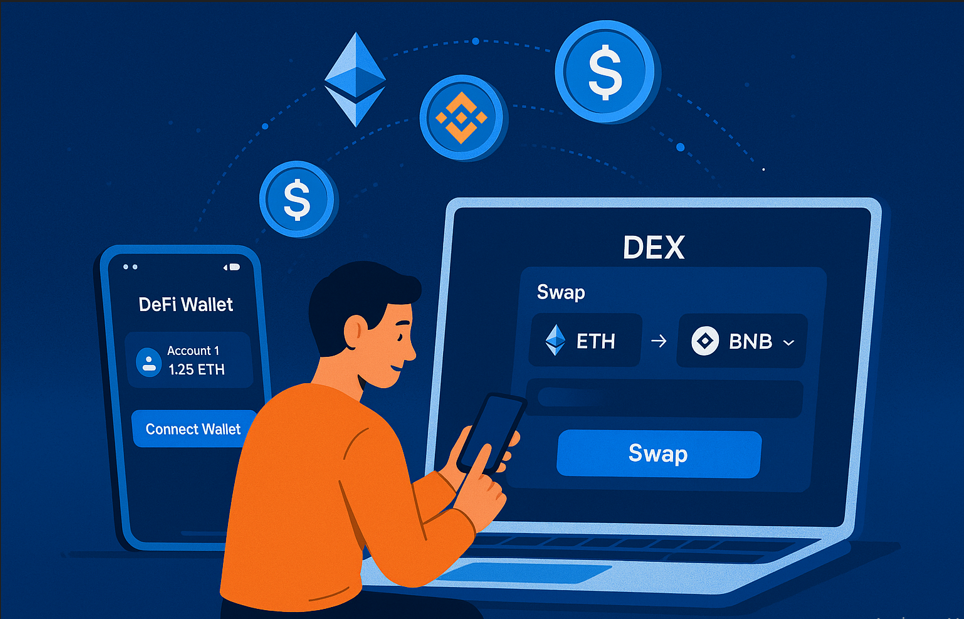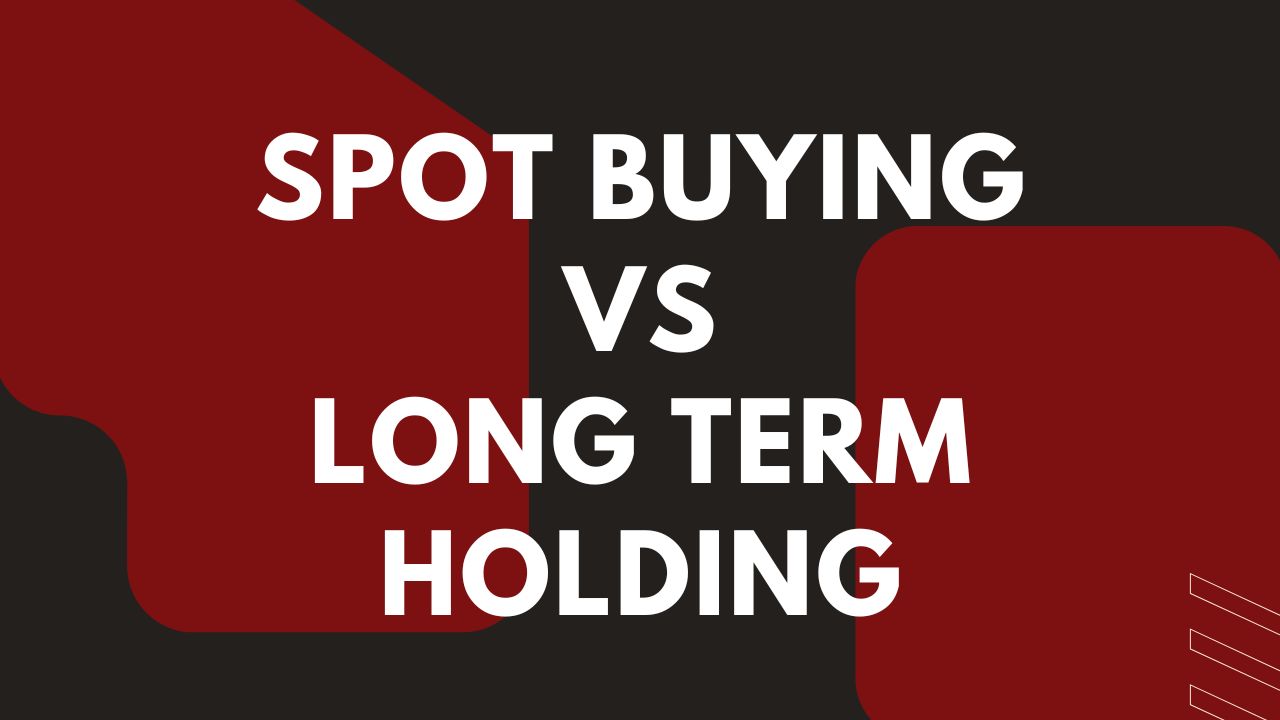What is a DeFi Wallet and How Does It Work for Beginners?
Decentralized Finance (DeFi) has taken the world of finance by storm. DeFi aims to create a more open, transparent, and decentralized alternative to traditional financial systems. One of the most essential components of DeFi is the DeFi wallet. But what exactly is a DeFi wallet, and how does it work? If you’re a beginner looking to dive into the world of DeFi, understanding how a DeFi wallet for beginners functions is the first step towards your journey into decentralized finance.
In this article, we’ll explore everything you need to know about DeFi wallets, from their purpose and functionality to how you can use them in 2025 to make secure transactions and grow your assets.
What is a DeFi Wallet?
A DeFi wallet is a digital wallet that enables you to interact with decentralized finance (DeFi) applications without relying on intermediaries like banks or centralized exchanges. According to Token metrics it allows users to store, manage, and transfer cryptocurrencies and other digital assets in a decentralized manner, giving individuals full control over their funds.
Unlike traditional crypto wallets, DeFi wallets integrate seamlessly with DeFi protocols, providing users with access to a wide range of decentralized services such as lending, borrowing, staking, and yield farming. Since these wallets are non-custodial, you hold the private keys to your assets, meaning you are the sole person responsible for securing your funds.
DeFi Wallets vs. Traditional Crypto Wallets
To better understand what makes a DeFi wallet unique, let’s compare it to a traditional crypto wallet. While both are designed to store and manage digital assets, the primary difference lies in their functionality:
| Feature | DeFi Wallet | Traditional Crypto Wallet |
|---|---|---|
| Custody | Non-custodial (You control your keys) | Custodial or non-custodial (depends on platform) |
| Use Case | DeFi apps, decentralized exchanges, yield farming | General crypto storage, transactions, and basic exchanges |
| Integration with DeFi | Seamless integration with decentralized protocols | Limited or no integration with decentralized finance apps |
| Security | Higher security, you control private keys | Security varies by platform (centralized wallets less secure) |
As you can see, a DeFi wallet is tailored for users looking to leverage decentralized services, giving them more control and flexibility.
How Do DeFi Wallets Work?
To understand how DeFi wallets work, it’s essential to know the two main components they interact with: blockchain networks and DeFi protocols.
Blockchain Networks: DeFi wallets operate on blockchain networks like Ethereum, Binance Smart Chain (BSC), and Solana. Each of these blockchains allows you to store and interact with various cryptocurrencies and digital assets. Your wallet interacts with these networks to perform functions like sending, receiving, and swapping tokens.
DeFi Protocols: DeFi protocols are decentralized applications (DApps) built on blockchains that offer financial services such as lending, borrowing, staking, and yield farming. With a DeFi wallet, you can connect to these protocols directly, enabling you to take advantage of high yields, borrow assets, or stake tokens in a trustless manner.
Key Features of DeFi Wallets
Private Key Control: You hold the private keys to your wallet, meaning you have full control over your assets. This is crucial in the DeFi ecosystem, where trust is decentralized.
Cross-Chain Compatibility: Many DeFi wallets are compatible with multiple blockchains, allowing you to interact with assets and services across different networks.
Integration with DeFi DApps: DeFi wallets can be connected directly to decentralized applications (DApps), giving you access to lending platforms, decentralized exchanges (DEXs), and liquidity pools.
Security: Most DeFi wallets feature robust security protocols like two-factor authentication (2FA) and biometric security to ensure that your private keys and assets remain safe.
How to Use a DeFi Wallet

Step 1: Choose a DeFi Wallet
Choosing the right DeFi wallet is the first step to securely managing your digital assets. Below are some of the best DeFi wallets for 2025:
MetaMask: MetaMask is one of the most popular DeFi wallets, known for its ease of use and strong integration with Ethereum-based DeFi protocols. It also supports other blockchains like Binance Smart Chain and Polygon.
Trust Wallet: A non-custodial wallet that supports numerous blockchains and DeFi services. It’s user-friendly and provides direct access to decentralized exchanges (DEXs) for token swaps.
Ledger Live: If you prefer hardware wallets, Ledger’s Ledger Live app is a secure way to manage DeFi assets, especially for users who prioritize security.
Step 2: Fund Your Wallet
Once you’ve set up your DeFi wallet, you’ll need to fund it with cryptocurrencies. You can deposit tokens into your wallet through centralized exchanges (CEXs) or use a peer-to-peer network. The most common tokens used for DeFi activities are Ethereum (ETH), Binance Coin (BNB), and Stablecoins like USDT and DAI.
Step 3: Connect to DeFi Protocols
After funding your wallet, you can connect it to DeFi platforms to start utilizing various financial services:
Lending and Borrowing: Platforms like Aave and Compound allow you to lend your assets and earn interest or borrow assets by collateralizing your tokens.
Yield Farming: Yearn.finance and other protocols offer opportunities for yield farming, where you can stake tokens in liquidity pools to earn returns.
Decentralized Exchanges (DEXs): You can use DEXs like Uniswap and Sushiswap to trade your tokens directly from your wallet, bypassing traditional centralized exchanges.
Step 4: Managing Your Funds
A DeFi wallet makes it easy to manage your funds across different decentralized services. You can monitor your staking rewards, swap tokens, or withdraw funds at any time. Always remember to secure your wallet with strong passwords and backup phrases to protect your assets.
How to Choose the Best DeFi Wallet in 2025

Choosing the best DeFi wallet for your needs in 2025 comes down to your specific use cases, security requirements, and the blockchain ecosystem you want to interact with. Here are some factors to consider:
Security: Opt for wallets that allow you to control your private keys and use encryption methods like 2FA or multi-signature wallets for enhanced security.
User Experience: Look for wallets that are easy to navigate, with a simple interface and helpful tutorials for beginners.
Compatibility: Make sure the wallet is compatible with the DeFi protocols you wish to use, whether it’s Ethereum, Solana, BSC, or another blockchain.
Community Support: A strong community and customer support can help when you run into any issues with your wallet or DeFi transactions.
Common Use Case Scenarios for DeFi Wallets
Staking: Staking is one of the most popular uses for DeFi wallets. You can stake Ethereum or other tokens and earn passive income through staking rewards. For instance, with MetaMask, you can stake ETH directly in Ethereum 2.0 or with other proof-of-stake blockchains.
Yield Farming: For users looking to earn high returns, DeFi wallets allow you to participate in yield farming, where you provide liquidity to platforms and earn fees or rewards.
Lending and Borrowing: DeFi wallets enable users to lend their assets for interest or borrow assets at competitive rates without relying on centralized intermediaries.
NFT Storage: If you’re a creator or collector of NFTs, a DeFi wallet can be used to securely store and manage your NFTs, making it easy to access decentralized markets for buying and selling.
Conclusion: Embrace the Future with a DeFi Wallet
A DeFi wallet is the cornerstone of decentralized finance, providing you with the tools and flexibility to interact with DeFi protocols and take control of your digital assets. Whether you’re staking, lending, borrowing, or participating in yield farming, a DeFi wallet for beginners is your gateway to the vast opportunities in DeFi.
By understanding how DeFi wallets work, choosing the best wallet for your needs, and using it to interact with DeFi protocols, you’re not just storing assets — you’re participating in a financial revolution. As we move into 2025, these wallets will only become more sophisticated and secure, opening up even greater opportunities for decentralized finance.
Read Also: The 5 Best Crypto Hardware Wallets and Their Features
Frequently Asked Questions (FAQs) About DeFi Wallets

1. What is the difference between a DeFi wallet and a regular crypto wallet?
A DeFi wallet differs from a regular crypto wallet in that it is specifically designed for use with decentralized finance (DeFi) protocols. While a traditional crypto wallet is used to store and transfer cryptocurrencies, a DeFi wallet provides additional features like staking, yield farming, and access to decentralized exchanges (DEXs). It’s also non-custodial, meaning you control your private keys and funds, giving you more security and autonomy over your assets.
2. Do I need a DeFi wallet to use DeFi protocols?
Yes, you need a DeFi wallet to interact with DeFi protocols like lending platforms, decentralized exchanges, and yield farming protocols. A DeFi wallet allows you to securely store, send, and receive digital assets, as well as sign transactions with the DeFi protocols you wish to use. It’s essentially your gateway to the decentralized finance ecosystem.
3. How do I secure my DeFi wallet?
Securing your DeFi wallet is crucial to protect your digital assets from theft or loss. Here are some essential tips:
Backup your private keys and recovery phrases: Write down your private keys and backup phrases on paper and store them in a safe place.
Enable two-factor authentication (2FA): If supported, use 2FA for an additional layer of security.
Use hardware wallets: For maximum security, store your DeFi wallet on a hardware wallet like Ledger or Trezor. This keeps your private keys offline and safe from online threats.
Avoid phishing attacks: Never click on suspicious links or share your private keys with anyone.
4. Can I use a DeFi wallet on multiple devices?
Yes, you can use most DeFi wallets on multiple devices as long as you have your private key or recovery phrase. Popular wallets like MetaMask allow you to sync your wallet across browsers and mobile devices, ensuring you can access your funds from anywhere.
5. What is the best DeFi wallet for beginners?
For beginners, the best DeFi wallet is one that offers ease of use, strong security, and seamless integration with popular DeFi protocols. Some of the most user-friendly wallets for beginners are:
MetaMask: Offers an intuitive interface and supports a wide range of DeFi protocols. It’s easy to set up and compatible with most DeFi platforms.
Trust Wallet: Known for its beginner-friendly design and broad compatibility with various blockchains and DeFi apps.
Coinbase Wallet: A non-custodial wallet that’s simple to use and integrates with the Coinbase platform, ideal for those just getting started.
6. Are DeFi wallets free to use?
Yes, DeFi wallets are typically free to use. However, you may incur transaction fees (gas fees) when interacting with DeFi protocols on networks like Ethereum. These fees are not charged by the wallet provider but are required to process transactions on the blockchain. The cost of these fees varies depending on network congestion and the type of transaction.
7. Can I use my DeFi wallet to buy and sell cryptocurrencies?
While DeFi wallets primarily serve to store and interact with cryptocurrencies on decentralized platforms, many wallets like MetaMask and Trust Wallet can be connected to decentralized exchanges (DEXs). These platforms allow you to swap and trade your assets directly from your wallet without relying on a centralized exchange.
8. What happens if I lose my DeFi wallet’s private key or recovery phrase?
Losing your private key or recovery phrase means losing access to your DeFi wallet and its contents. Unlike centralized wallets, where you can reset your password, DeFi wallets are non-custodial, meaning no one else can help you recover your assets. That’s why it’s crucial to securely store your private keys and recovery phrases in a safe location.
9. Can I use a DeFi wallet for NFTs (Non-Fungible Tokens)?
Yes, many DeFi wallets support NFTs and allow you to store, send, and receive them. For example, MetaMask and Trust Wallet allow you to connect to NFT marketplaces like OpenSea, where you can buy and sell NFTs directly from your wallet. These wallets store the unique digital tokens that represent ownership of NFTs.
10. How do I choose the best DeFi wallet for 2025?
When choosing a DeFi wallet for 2025, consider the following factors:
Security: Look for wallets that offer multi-layer security features such as encryption, 2FA, and hardware wallet support.
Compatibility: Ensure the wallet supports multiple blockchains and can integrate with the DeFi protocols you plan to use.
User Interface: Choose a wallet with an easy-to-use interface, especially if you’re a beginner.
Community and Support: A strong community and reliable customer support can be invaluable if you run into issues.
Some of the best DeFi wallets for 2025 include MetaMask, Trust Wallet, and Ledger Live. Each of these wallets supports a wide range of DeFi protocols and provides enhanced security features.
11. Is it safe to store all my assets in a DeFi wallet?
While DeFi wallets are secure, it’s important to understand that they are only as safe as your security practices. It’s always recommended not to store large amounts of funds in a single wallet, especially if you plan to interact with high-risk DeFi protocols. Consider diversifying your holdings and using hardware wallets for long-term storage to keep your assets safe from hacking and theft.
Discover more from Dipprofit
Subscribe to get the latest posts sent to your email.



